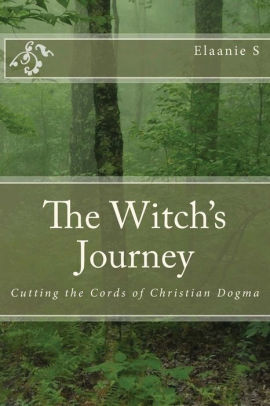In the seventh chapter of the book, Elaanie S. writes what would also have made an excellent opener to her book: "I want to be clear that I am in no way trying to discredit Christianity for others, nor am I proselytizing for the path of Paganism; and specifically, I am not proselytizing for Witchcraft." She has truly walked the path of the Christian and the witch, and she has written a book to help other conflicted Christians feeling called off the path decide whether to stay the course or take a turn where their spiritual crisis has forked.
Elaanie S. began her life as a committed Christian. She went to Sunday School, she prayed, and when she finally fell pregnant by an older boyfriend, she did as the church and her mother prescribed and married him. Despite the errors of Christian belief that trapped her in an abusive relationship with this man, responsible guidance from the Christian church also saved her. An older male religious leader helped her recognize the value of her own safety and happiness and guided her to leave her first marriage. It was only after her second marriage ended that her religious community turned on her. What she found, after a long journey through Christian churches intrusive and unwelcoming, exposure to Zen Buddhism, and struggles with her old beliefs, was witchcraft.
Elaanie's narrative is personal, moving, and revealing of the bugaboo of southern Christianity and of the thought processes necessary to overcome deep indoctrination. Mississippi as a culture is an influence in her story as much or more than her mother is. Her story is not one of simple conversion: it is one about the tyranny and risks of normative theocracy.
Do not assume this operates on the Pagan apologetics of Gus diZerega’s Pagans & Christians. Elaanie looks at her transition out of Christianity, and her process behind it, with a more emotionally sensitive understanding of both scripture and cultural attachment. Her knowledge of Biblical scripture is sound, as is her understanding of its irrelevance to Wicca.
One passage that witches outside of Wicca may find troubling: in it Elaaanie shares that she suffered ridicule for identifying as a Christian witch. She likely exposed herself to people with a very narrow understanding of witchcraft versus the Craft. While in her case she did need to move beyond the Christian identification for her own fulfillment, the people that mocked her deserve significant embarrassment. Witchcraft, despite its current ethnocentric designation by certain Wiccans, is an anthropological universal. It can be claimed as a person’s religion but doing so places it under a narrow denominational definition. It would be like a Baptist saying a Catholic isn’t Christian. Catholics and Baptists really do that to each other, but that doesn’t make it true.
Elaanie also, as is common in introductions to the theology of Wicca, denies any belief in Satan. In a refreshing change of pace, however, she investigates what Satanists themselves believe. She goes so far as to correctly different types of Satanism and explains how some might view themselves as Pagan without making judgements on their practices.
This book is about more than a personal experience; it’s about a thought process. Spiritual seekers of any path stand to benefit from Elaanie’s knowledge and experience. For people feeling a calling off the Christian path, this will help them resolve a lot of their inner conflicts. This book does is gives the reader a pathway to think about their beliefs and free themselves from dogmas that no longer serve them. Any magical practitioner could benefit from such a practice.
~review by Diana Rajchel
Author: Elaanie S.
The Witch’s Weeds LLC, 2017
pp. 215, $17.95

